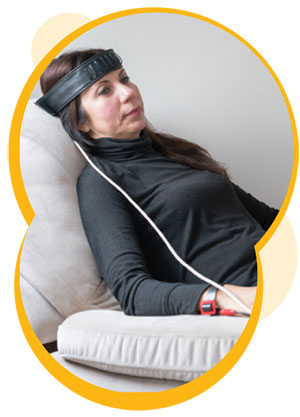Biofeedback is an approach that some people use to treat their arthritis symptoms. The information below will help you understand more about this therapy, if it can help with your symptoms of arthritis, and how to find a provider.
What is biofeedback?
 Biofeedback is a way of re-training your mind to experience pain, stress, or anxiety differently. To help calm these symptoms many different tools may be used, such as mindfulness, breathing exercises, or other techniques.
Biofeedback is a way of re-training your mind to experience pain, stress, or anxiety differently. To help calm these symptoms many different tools may be used, such as mindfulness, breathing exercises, or other techniques.
By learning how to control your response to pain, stress, or anxiety in the moment through repeated practice, your body learns relaxation techniques that can be used more easily each time you experience these feelings.
How does biofeedback work?
This treatment uses electrodes to monitor your heart rate, breathing, sweat levels, and other forms of stress markers to help regulate your body's response to pain. When pain, stress, or anxiety occur, you can see the visual and audio effects of it through a display screen. These visual and audio representations can help you and your therapist better understand your body's response to pain so that you can learn to control what is happening in the moment.
Different types of biofeedback may be collected to measure different functions of the body, including skin temperature, muscle tension and activity, sweating, brain waves, and/or heart rate. A biofeedback therapist will then use the data to select relaxation techniques and mental activities or exercises to help you learn to better regulate your body's response.
Can biofeedback be used to treat arthritis symptoms?
Some research has found that biofeedback may be helpful for some medical conditions, though evidence of its effectiveness for arthritis is limited. Further research needs to be done to more clearly determine the impact of biofeedback on arthritis symptoms.
How do I find a provider?
Biofeedback therapy is often conducted by psychologists, psychiatrists or general physicians with special training in this area. When looking for someone who can provide biofeedback therapy, ask about the type of training or experience they have with biofeedback for pain management.